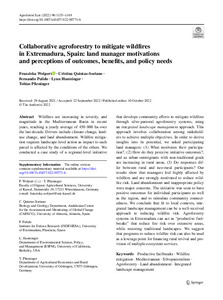| dc.date.accessioned | 2022-11-25T08:17:14Z | |
| dc.date.available | 2022-11-25T08:17:14Z | |
| dc.date.issued | 2022-10-10 | |
| dc.identifier | doi:10.17170/kobra-202211257161 | |
| dc.identifier.uri | http://hdl.handle.net/123456789/14263 | |
| dc.description.sponsorship | Gefördert im Rahmen des Projekts DEAL | ger |
| dc.language.iso | eng | eng |
| dc.rights | Namensnennung 4.0 International | * |
| dc.rights.uri | http://creativecommons.org/licenses/by/4.0/ | * |
| dc.subject | productive fuelbreaks | eng |
| dc.subject | wildfire mitigation | eng |
| dc.subject | Mediterranean | eng |
| dc.subject | silvopastoralism | eng |
| dc.subject | agroforestry | eng |
| dc.subject.ddc | 550 | |
| dc.title | Collaborative agroforestry to mitigate wildfires in Extremadura, Spain: land manager motivations and perceptions of outcomes, benefits, and policy needs | eng |
| dc.type | Aufsatz | |
| dcterms.abstract | Wildfires are increasing in severity, and magnitude in the Mediterranean Basin in recent years, reaching a yearly average of 450 000 ha over the last decade. Drivers include climate change, land-use change, and land abandonment. Wildfire mitigation requires landscape-level action as impact to each parcel is affected by the conditions of the others. We conducted a case study of a regional-level initiative that develops community efforts to mitigate wildfires through silvo-pastoral agroforestry systems, using an integrated landscape management approach. This approach involves collaboration among stakeholders to achieve multiple objectives. In order to derive insights into its potential, we asked participating land managers: (1) What motivates their participation?, (2) How do they perceive initiative outcomes?, and as urban outmigrants with non-traditional goals are increasing in rural areas, (3) Do responses differ between rural and neo-rural participants? Our results show that managers feel highly affected by wildfires and are strongly motivated to reduce wildfire risk. Land abandonment and inappropriate policy were major concerns. The initiative was seen to have positive outcomes for individual participants as well as the region, and to stimulate community connectedness. We conclude that fit to local contexts, integrated landscape management can be a well-received approach to reducing wildfire risk. Agroforestry systems in Extremadura can act as “productive fuelbreaks” that reduce fire risk over extensive areas, while restoring traditional landscapes. We suggest that programs to reduce wildfire risk can also be used as a leverage point for financing rural revival and provision of multiple ecosystem services. | eng |
| dcterms.accessRights | open access | |
| dcterms.creator | Wolpert, Franziska | |
| dcterms.creator | Quintas-Soriano, Cristina | |
| dcterms.creator | Pulido, Fernando | |
| dcterms.creator | Huntsinger, Lynn | |
| dcterms.creator | Plieninger, Tobias | |
| dc.relation.doi | doi:10.1007/s10457-022-00771-6 | |
| dc.subject.swd | Mittelmeerraum | ger |
| dc.subject.swd | Spanien | ger |
| dc.subject.swd | Waldbrand | ger |
| dc.subject.swd | Brandbekämpfung | ger |
| dc.subject.swd | Agroforstwirtschaft | ger |
| dc.type.version | publishedVersion | |
| dcterms.source.identifier | eissn:1572-9680 | |
| dcterms.source.issue | Issue 8 | |
| dcterms.source.journal | Agroforestry Systems | eng |
| dcterms.source.pageinfo | 1135-1149 | |
| dcterms.source.volume | Volume 96 | |
| kup.iskup | false | |


